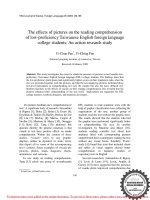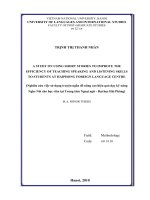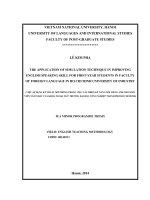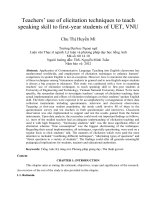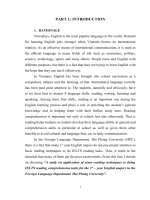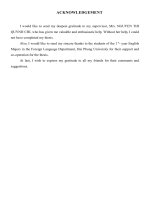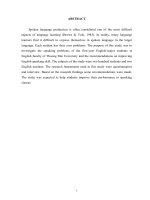enhancing effects of exploiting academic vocabulary on speaking skill of third year students of english, foreign language department, dong thap university
Bạn đang xem bản rút gọn của tài liệu. Xem và tải ngay bản đầy đủ của tài liệu tại đây (576.8 KB, 61 trang )
1
CONTENTS
Declaration i
Acknowledgements ii
Abstract iii
List of tables iv
Contents …1
INTRODUCTION 3
1.1. Motivation of the study 3
1.2. Aims of the study 4
1.3. Research methods 4
1.4. Scope of the study 4
1.5. Significance of the study 5
1.6. Related previous studies 5
1.7. Organization of the thesis 5
CHAPTER 1: LITERATURE REVIEW 6
1.1. Communication and stages of communication process 6
1.1.1. The definition of communication 6
1.1.2. Phases of the communication process 7
1.3. The importance of learning English 10
1.4. The exploiting of vocabulary in communication 12
1.5 Number of words in English 13
CHAPTER 2: METHODOLOGY OF THE STUDY 16
2.1. Research questions 16
2.2. Research participants 16
2
2.2.1. The researcher 16
2.2.2. The subjects 16
2.3. Research instruments 16
2.3.1. Questionnaire for students 16
2.3.2. Observations 18
CHAPTER 3: RESEARCH RESULTS, DISCUSSIONS AND
SUGGESTIONS 19
3.1. Research results 19
3.1.1. Questionnaire 19
3.2. Discussions 43
3.2.1. Research question 1: 43
3.2.1. Research question 2 44
3.3. Suggestion 45
3.3.1. Doing study on Academic Words List (AWL) 45
3.3.1.1. From textbooks 45
3.3.1.2. From TOEFL books 47
3.3.1.3. From internet 48
3.3.2. Applying academic words on speaking in English 49
CONCLUSION 51
REFERENCES 52
APPENDIX 53
Appendix 1 56
Appendix 2 60
3
INTRODUCTION
1.1. Motivation of the study
There are many reasons why English is so popular and the domination
of English language globally is undeniable because English is the
language of diplomacy, international communications, business, tourism,
education, science, computer technology, media and internet. Learning
English can increase the earning power of citizens in developing countries by
25%, according to a new study from the British Council, the United
Kingdom’s education and cultural relations organization, was published in
2011. It also found that developing economies needs to access to English if
they are to position themselves in the global economy.
Moreover, the faster economic globalization is going hand in hand with
growing use of English when economic ties are belong to together in
globalization trends, domestic enterprises have to sign commitments,
contracts or they communicate and negotiate with foreign enterprises in
English which maintain their international business cooperation on stable, so
English is the language for doing international business. As consequence,
companies need employees who are in relation with foreign clients or
suppliers to have communicative skill in English which to encourage firms'
development. On demand of reality, a lot of students is going to gain A , B, C
level or TOEFL or IELTS certificate to prepare for their major or apply for
their future job because they believe that English degree is dominant of on
applicants' profiles help them for getting more advantages than other
competitors. Thus, they want to get high points on A, B, C level or TOELL,
IELTS certificate. However, it is not easy to learn English well. Specially, on
4
speaking skill, learners attempt barricade to master not only in turning
intonation and facial expression but also in exploiting academic vocabulary.
For the sake of this, the researcher determines to do the study entitled
"Enhancing effects of exploiting academic vocabulary on speaking skill of
third year students of English, Foreign Language Department, Dong Thap
University‖.
1.2. Aims of the study
The study aims at:
- investigating the reality of exploiting academic vocabulary on
speaking subject of third-year student ò English at Dong Thap University.
- applying academic vocabularies and find out their effects on the
students’ speaking skill.
- giving some suggestions.
1.3. Research methods
During studying process, there are three research methods which are
going to collect valuable data. Firstly, the questionnaires are employed to
investigate the reality of exploiting academic vocabulary on speaking skill of
the third year students of English, Foreign Language Department, Dong Thap
University. In chain, after getting statistic results of the initial method, the
researcher will process four observations on speaking class hours to
crosscheck the results of questionnaire.
1.4. Scope of the study
The scope of study is about enhancing the effects of exploiting the
academic vocabulary on speaking skill of the third year students of English,
Foreign Language Department, Dong Thap University.
5
1.5. Significance of the study
The findings of the study, hopefully, make a significant contribution to
enhance speaking English for students towards exploiting academic
vocabulary. In addition, the achievement of the thesis will help them realize
the grandness and effectiveness of applying academic vocabulary. Through
the study, the students mention to develop it more frequently. Furthermore, the
applying is not only helpful to pass speaking subject effectively but also
profitable for communication in English or advantageous to access higher
education, TOEFL or IELTS certificate.
1.6. Related previous studies
In Dong Thap university, Vo Thi Ngoc Diem, student of English 2005
presented ―planning a speaking lesson: problems and solutions‖. She stated
the errors in planning of a speaking lesson and suggested some ways to set up
a better planning a speaking lesson to aid student conceived good speaking
skills.
1.7. Organization of the thesis
Introduction represents the motivation, the aims, the significance, scope and
the organization of the thesis.
Chapter 1: Literature Review aims at reviewing related literature.
Chapter 2: Methodology addresses the methods and procedures to collect data
and conduct the study.
Chapter 3: Results, Discussions and Suggestion presents and discusses the
findings of the study based on the collected data.
Conclusion contains the summary of the study findings and the pedagogical
applicability as well as further research.
6
CHAPTER 1: LITERATURE REVIEW
1.1. Communication and stages of communication process
1.1.1. The definition of communication
―Communication is the activity of conveying meaningful information.
The imparting or exchanging of information or news by the verbal or
nonverbal exchange of information. Communication has been derived from
the Latin word "communis", meaning to share. Communication requires a
sender, a message, and an intended recipient, although the receiver need not
be present or aware of the sender's intent to communicate at the time of
communication; thus communication can occur across vast distances in time
and space. Communication requires that the communicating parties share an
area of communicative commonality. The communication process is complete
once the receiver has understood the message of the sender.‖
(www.wikipedia.org)
Nonverbal communication describes the process of conveying meaning
in the form of non-word messages. Research shows that the majority of our
communication is nonverbal, also known as body language. Some of
nonverbal communication includes chronemics, haptics, gesture, body
language or posture; facial expression and eye contact, object communication
such as clothing, hairstyles, architecture, symbols infographics, and tone of
voice as well as through an aggregate of the above.
Speech also contains nonverbal elements known as paralanguage. These
include voice lesson quality, emotion and speaking style as well as prosodic
features such as rhythm, intonation and stress. Likewise, written texts include
7
nonverbal elements such as handwriting style, spatial arrangement of words
and the use of emoticons to convey emotional expressions in pictorial form.
Verbal communication refers to the use of sounds and language to relay
a message. It serves as a vehicle for expressing desires, ideas and concepts and
is vital to the processes of learning and teaching. In combination with
nonverbal forms of communication, verbal communication acts as the primary
tool for expression between two or more people.
Interpersonal communication and public speaking are the two basic
types of verbal communication. Whereas public speaking involves one or
more people delivering a message to a group, interpersonal communication
generally refers to a two-way exchange that involves both talking and
listening.
1.1.2. Phases of the communication process
Communication barriers can appear at every stage of the communication
process which consists of sender, message, channel, receiver, feedback and
context which have the potential to create misunderstanding and confusion.
To be able to become successful communicator and to avoid misunderstanding
and confusion, communicator had better be to lessen these barriers at each
stage of this process with clear, accurate, well-oriented communications.
In addition, communicator should catch characteristics of each stage. Each
stage of the communication process has some notable features such as
1.1.2.1. Source
As the source of the message, communicator needs to be clear about
why you're communicating, and what you want to communicate. You also
8
need to be confident that the information you're communicating is useful and
accurate.
1.1.2.2. Message
The message is the information that you want to communicate.
1.1.2.3. Encoding
This is a stage of transferring the information you want to communicate
into a form that can be sent and correctly decoded at the other end. Success in
encoding depends partly on ability to convey information clearly and simply,
but also on your ability to anticipate and eliminate sources of confusion (for
example, cultural issues, mistaken assumptions, and missing information.) A
key part of this is your audience: Failure to understand who you are
communicating with will result in delivering messages that are misunderstood.
1.1.2.4. Channel
Messages are conveyed through channels, with verbal communication
including meetings, telephone and written communication including reports
emails, and letters.
Each channel has different strengths and weaknesses. For example, it is
particularly difficult to give a long list of directions verbally, while quickly
causing problems if criticizing someone strongly by letter.
1.1.2.5. Decoding
Just as confusion can emerge errors from encoding. This is particularly
the case if the decoder can recode information from sender. Just as successful
encoding is a skill, so is successful decoding that is involving, for example,
taking the time to read a message carefully, or listen actively to sender.
9
1.1.2.6. Receiver
Message is delivered to receiver who has own ideas and feelings which
will undoubtedly influence their understanding of sender’s message. To be a
successful communicator, you should consider these before delivering your
message, and act appropriately.
1.1.2.7. Feedback
Receiver will provide sender with feedback, verbal and nonverbal
reactions to sender’s communicated message. They also pay closest attention
to the feedback that allows them to be confident that their receiver has
understood sender’s message. If the sender sees that there has been a
misunderstanding, at least they have the opportunity to send the message a
second time.
1.1.2.8. Context
Context has a strong influences because sender’s message is delivered in
the context. This may include the surrounding environment or broader culture
which impacts in decoding.
1.2. The impact of communication skills
Good communication skills are more important than they have ever
been. It is difficult to neglect the importance of
communication skills. Today, with the emphasis on teamwork in the
workplace, communication skills are a most important
trait to develop.
Without the ability to communicate that leads poor relationships with
us, with others and with our world. These are outstanding impact of
communication skills.
10
1.2.1. At personal level
Exploiting communication skill is able to limit breakdowns in marriage,
families, friendships because these relationships often happen conflicts to
solve these problems that each individual applies communication skill to
negotiate, explain, express viewpoints clearly to avoid conflicts.
1.2.2. In the work place
Good communication is essential to maintain an efficient work.
Miscommunication can lead to employee conflicts, a drop in morale and
turnover. In certain cases, neither side of a miscommunication issue is aware
of the problem until it is pointed out to them. One of the first methods to use
in combating miscommunication is to get both parties into a room and clarify
the issues. At that time, Good communication is essential to both parties.
1.3. The importance of learning English
English has become one of the most important languages in the world.
English is used in politics, business dealings, and everyday life. Many people
are finding it hard by without knowing English. The global language of
English is found in popular music, television programs and even on the
internet. As a whole, there are more websites made in English than anywhere
else. Realizing the importance of English, many people have taken it on as a
second language. For the millions of immigrants that come to the United
States from non-English-speaking countries every year. Working knowledge
of the English language can create many opportunities in international markets
and regions.
11
1.3.1. International language
English is the most spoken official language in the world. It is the
primary language used in international affairs. The English language has
official status even in nations where it is not the primary spoken language.
English is indisputably the primary language of global trade and commerce. In
many countries, most tourism authorities and other officials in contact with the
public speak English to interact and engage with tourists and immigrants.
1.3.2. In business
The business world needs for the global language of English as well.
Many companies are expanding overseas. There are companies that wish to
transfer over to America. The language barrier must be broken somehow, so
people in the business world are learning English. This makes it easier to
broker deals, or tell potential partners what is expected of them. It is also a
good way to communicate with potential employees. It is often the tradition of
the business world that you need to know your potential partner's native
tongue. So if an American wants to initiate a deal with a Japanese business
partner, the American needs to know Japanese. It's considered proper business
etiquette. With other countries wanting to set up businesses in English
speaking countries, or needing to appeal to English speaking customers, they
need to learn English.
1.3.2. In digital age
Nowadays, all kinds of digital products such as digital camera, digital
television, digital dictionary, software and allied technologies, the primary
language of the ubiquitous and all-influential World Wide Web is English a all
around the world. English is typically the language of latest-version
12
applications, social media networks and websites. Software manuals,
hardware-installation guides and product fact sheets are available in English
first before being made available in other languages.
1.3.3. In education
In universities and colleges in Great Britain, the Unites States, Canada,
Australia, New Zealand and Singapore, which attract the most number of
international students, the primary language of instruction is English. Most of
the top business schools, medical centers and advanced-study institutes are
located in North America and Great Britain, and English is the language used
in every activity at these institutions of higher learning. Most journals and
technical periodicals that give international acclaim to scientists, engineers,
technologists, and technocrats are printed in English.
1.3.4. Job Opportunities
Knowing English opens job and employment opportunities in many
countries and markets. We can expand job offerings and placements if we add
English to our resume. In economy today, it is almost a requirement to
dominate the terminology. Upgrade your possibilities and income by feeding
our communication skill in English.
1.4. The exploiting of vocabulary in communication
Vocabulary is one of the most crucial factors in communication. While
it is important to build vocabulary, but it is equally important to understand
that a message is reached to the audience correctly. Here are some key factors
in exploiting vocabulary effectively.
1.4.1. Simplicity
13
When we communicate by using either spoken verbal or written form,
we should aim at the simplicity of the message. Do not try to add too many
flashy words just to impress others.
1.4.2. Clarity
The strength of communication vocabulary needs to be perfectly
complemented with the clarity of thoughts. Therefore, it is important to make
up your mind before speaking or writing.
1.4.3. Target Audience
Choose the style as per our audience. For instance, we are delivering a
speech within your organization and are addressing your professional
colleagues, so, it is ok to use professional jargons and technical terms. But, if
we are talking to our customer, who is not from your field, it is inappropriate
to use heavy professional terms.
1.4.4. Right Words
Choose your communication vocabulary words carefully, because even
a mispronunciation or a wrong word can bring you in serious trouble.
Therefore, you need to seriously work on building a strong and an enviable
communication vocabulary.
1.4.5. Practice
Vocabulary building alone is not sufficient; we need to practice
constantly, in order to be perfect in both the written and spoken
communication.
1.5 Number of words in English
The vocabulary of English is undoubtedly vast, but assigning a specific
number to its size is more a matter of definition than of calculation. Unlike
14
other languages such as French, German, Spanish and Italian, there is no
academy to define officially accepted words and spellings. Neologisms are
coined regularly in medicine, science, technology and other fields, and new
slang is constantly developed. Some of these new words enter wide usage;
others remain restricted to small circles. Foreign words used in immigrant
communities often make their way into wider English usage. Archaic,
dialectal, and regional words might or might not be widely considered as
"English".
The Oxford English Dictionary, 2nd edition (OED2) includes over
600,000 definitions.
The editors of Webster's Third New International Dictionary,
Unabridged (475,000 main headwords) in their preface, estimate the number
to be much higher. It is estimated that about 25,000 words are added to the
language each year.
The Global Language Monitor announced that the English language had
crossed the 1,000,000-word threshold on 10 June 2009. The announcement
was met with strong skepticism by linguists and lexicographers. Though a
number of non-specialist report accepted the figure uncritically. However, in
December 2010 a joint Harvard and Google study found the language to
contain 1,022,000 words and to expand at the rate of 8,500 words per year.
The findings came from the computer analysis of 5,195,769 digitized books.
`1.6. The Academic Word List
The Academic Word List (AWL) was developed by Averil Coxhead at
the School of Linguistics and Applied Language Studies at Victoria University
of Wellington, New Zealand. The list concludes of 570 semantic fields which
15
were selected because they appear with great frequency in a broad range of
academic texts. The list does not include words that are in the most frequent
2000 words of English (the General Service List), thus most of the words are
specific to academic contexts. The AWL was primarily made so that it could
be used by teachers (especially teachers of English as a Second Language) as
part of a programme preparing learners for tertiary level study or used by
students working alone to learn the words most needed to study at colleges
and universities.
The 570 words are divided into 10 sublists. The sublists are ordered
such that the words in the first sublist are the most frequent words and those in
the last sublist are the least frequent.
16
CHAPTER 2: METHODOLOGY OF THE STUDY
2.1. Research questions
2.1.1. How are the academic vocabulary exploited on speaking skill by third
year students of English, Foreign Language Department, Dong Thap
University?
2.1.2. What are the effects of exploiting academic vocabulary on speaking
skill by third year students of English, Foreign Language Department, Dong
Thap University?
2.2. Research participants
2.2.1. The researcher
The researcher is Do Thanh Hong, English08A class, Foreign Language
Department, Dong Thap University.
2.2.2. The subjects
The subject of the study is the third year students of English, Foreign
Language Department, Dong Thap University.
2.3. Research instruments
2.3.1. Questionnaire for students
The researcher applies the questionnaire in the study because they are
helpful and convenient. In addition, the questionnaires are set up to many
items in order to collect typical and various data from a large number of
respondents at the same time. Moreover, the respondents will fulfill more
truthful because their anonymity assured. The researcher can format a series of
relevant answers which serves for study’s dimension afterwards. The
researcher is going to compose the questionnaire consisting of 15 items for
third year students.
17
The questionnaires are designed in Vietnamese to avoid
misunderstanding to the respondents and round the exploiting academic
vocabulary.
Question 1, 11, 12, 13, 14 are to know students’ viewpoints on speaking skill.
Question 2, 4, 5, 9, 10 are to know students’ concerns to academic vocabulary.
Question 3 is to know when students exploit academic vocabulary.
Question 6 is to know how students’ preparing academic vocabulary.
Question 7 is to know where students study academic vocabulary.
Question 8 is to know about spending time studying academic vocabulary.
Option 15.1, 15.2, 15.3, 15.4, and 15.5 to know students’ choosing academic
vocabulary.
1. Do you like speaking English?
2. Do you know about academic vocabulary?
3. Have you ever used academic vocabulary in:
4. Do you pay more attention on exploiting academic vocabulary when you
speak in English?
5. Can you distinguish between academic vocabulary and daily vocabulary?
6. Have you prepared academic vocabulary before you present a report or a
discussion in front of class?
7. Where have you studied academic vocabulary from?
8. How much time do you study academic vocabulary?
9. How many academic words do you guess?
10. How is your exploiting academic vocabulary?
11. Is it difficult to study academic vocabulary?
12. Is it difficult to use academic vocabulary?
18
13. Is your report evaluated highly when you exploit academic vocabulary for
reporting?
14. How will be helpful for oral tests, protection of thesis, TOEFL or IELTS
when you study academic vocabulary at right now?
15. Choose one relevant option to fill in the each blank of the passage ―The
History of Life on Earth‖ that you are going to report.
2.3.2. Observations
Classroom observation helps the researcher to crosscheck the statistics
from the questionnaires. The results of the observation will be more objective
and reliable for the thesis. Additionally, the observing helpfully investigates
how academic vocabulary is exploited in class hours and how its effects on
student’s performance.
19
CHAPTER 3: RESEARCH RESULTS, DISCUSSIONS AND
SUGGESTIONS
3.1. Research results
3.1.1. Questionnaire
4.1.1.1 Students’ viewpoints on speaking skill
Table 1 shows most students (50%) like speaking English and like a
little (32%) while some students (11%) like very much and (7%) do not like
speaking English.
Table 1: Students’ thought about speaking English
Statements
Like very
much
Like
Like a little
Do not
like
Frequencies (f)
11
50
32
7
Percentages (%)
11
50
32
7
Figure 1:
11%
50%
32%
7%
Like very much
Like
Like a little
Do not like
As figures in the table 2, a large number of students state that studying
academic vocabulary is very difficult (37%) and difficult (34%). On the
20
contrast, some of them think that is normal (11%), easy (13%) and very easy
(5%).
Table 2: Students’ thought about studying academic vocabulary.
Statements
Very
difficult
Difficult
Normal
Easy
Very
easy
Frequencies (f)
37
34
11
13
5
Percentages
(%)
37
34
11
13
5
Figure 2:
37%
34%
11%
13%
5%
Very difficult
Difficult
Normal
Easy
Very easy
Most students (39%) thought that exploiting academic vocabulary is
difficult and (25%) is normal. A few students are easy (7%) and (9%).
Table 3: Students’ thought about exploiting academic vocabulary.
Statements
very
difficult
difficult
Normal
easy
very
easy
Frequencies (f)
10
39
25
7
9
Percentages
(%)
10
39
25
7
9
21
Figure 3 :
11%
43%
28%
8%
10%
Very difficult
Difficult
Normal
Easy
Very easy
In the table 4, a great number of students (60%) evaluate their report
exploited academic vocabulary is often remarkable and (23%) think that is
always. Only 3% of them tell that is rarely and 0% of them is never.
Table 4: Students’ thought about remarking their report exploited academic
vocabulary.
Statements
Always
Often
Sometimes
Rarely
Never
Frequencies (f)
23
59
15
3
0
Percentages
(%)
23
59
15
3
0
22
Figure 4 :
A large number of students think that exploiting academic vocabulary is
helpful (67%) and 1% of them think that is unhelpful.
Table 5: Students’ thought about profits of exploiting academic vocabulary
for oral tests, protection of thesis, TOEFL or IELTS.
Statements
Very helpful
Helpful
Normal
Unhelpful
Frequencies (f)
9
67
23
1
Percentages (%)
9
67
23
1
Figure 5:
9%
67%
23%
1%
Very helpful
Helpful
Normal
Unhelpful
23%
59%
15%
3%
0%
Always
Often
Sometimes
Rarely
Never
23
3.1.1.2. Students’ concerns to academic vocabulary
60% of students only know a little about academic vocabulary while the
percent that student know well is 8%.
Table 6: Students’ concerns to academic vocabulary.
Statements
Know well
Know
Know a little
Do not
know
Frequencies (f)
8
14
60
18
Percentages (%)
8
14
60
18
Figure 6:
8%
14%
60%
18%
Know well
Know
Know a little
Do not know
While students are speaking English they rarely (40%) and never (36%)
pay more attention on exploiting academic vocabulary. They sometimes
(17%) care about exploiting academic vocabulary.
Table 7: Students’ attention on exploiting academic vocabulary on speaking
English.
Statements
Always
Often
Sometimes
Rarely
Never
Frequencies (f)
1
6
17
40
36
Percentages (%)
1
6
17
40
36
24
Figure 7:
1%
6%
17%
40%
36%
Always
Often
Sometimes
Rarely
Never
Most Students know how to distinguish between academic vocabulary
and daily vocabulary only a little (35%). The percentages they do not know is
44%.
Table 8: Students’ ability distinguishes between academic vocabulary and
daily vocabulary.
Statements
know well
know
know a little
do not
know
Frequencies (f)
3
18
35
44
Percentages (%)
3
18
35
44
25
Figure 8:
3%
18%
35%
44%
Know well
Know
Know a
little
Do not
know
In table 9, a great number of students (79%) cannot estimate quantity of
academic vocabulary. Only 21% of them guess correctly.
Table 9: Students’ guessing about the quantity of academic vocabulary.
Statements
2000
words
1500 words
570
words
200 words
100
words
Frequencies (f)
23
18
21
22
16
Percentages
(%)
23
18
21
22
16
Figure 9:
20%
20%
20%
20%
20%
2000
words
1500
words
570 words
200 words
100 words
